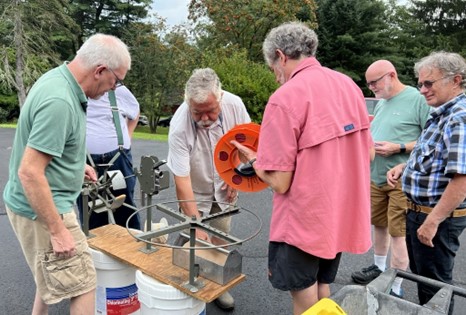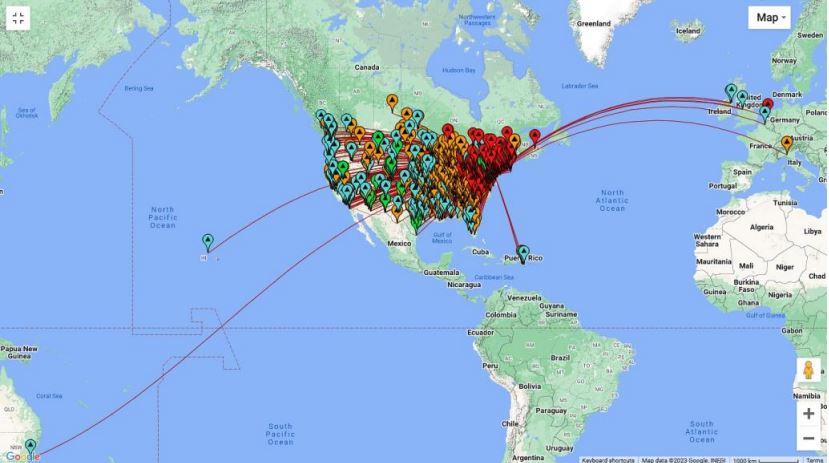 October 17, 2023 Editor: Michael Walters, W8ZY | |||
Mentorship through An Antenna Build After Field Day 2023, the Candlewood Amateur Radio Association (CARA) determined that it would be best to use a dedicated 80/75-meter dipole, rather than the multiband off-center-fed antenna that had been used previously. This would give the club dedicated antennas for 80, 40, 20, 15, and 10 meters. Dan Fegley, W1QK, suggested that the antenna be built with a single pole knife switch so it would be shorter for the SSB section of the band. It was decided to have the switch around 3.9 MHz, as well as 3.55 MHz (the desired CW portion of the band) for the full length of the antenna when the switch is closed. Working measurements were calculated, and a preliminary sketch was made for the antenna. The antenna will be used for ARRL Field Day and Winter Field Day and be put up as an inverted v. A while back, ARRL Connecticut Section Technical Coordinator Steve Simons, W1SMS, shared that he would like to host some sort of technical hands-on activity at his house. John Ahle, W1JMA, suggested having a build project for this antenna on August 12 from 1 to 3 PM. Invitations were sent to CARA club members and other hams from surrounding clubs that had expressed an interest in antenna building. Materials for the project were obtained, and prior to the event, John and Steve shot lines over trees to evaluate the antenna and settled on how the knife switch would be employed in the construction.
About a dozen CARA members and other local hams arrived at Steve's for the build. After an hour delay from the rain, the project began. The first steps were to explain the concept of the antenna, as well as the working calculations and design. Wire was measured and cut for each leg of the dipole for the 3.9 and 3.55 MHz sections. The wire was soldered to the center insulator, and the end insulators were temporarily put on the antenna so we could evaluate the SWR for the SSB section. Steve had several instruments that could be used for SWR measurements, including an MFJ-269 antenna analyzer, an Array Solutions AIM-UHF vector network analyzer, and a newly purchased NanoVNA. Most measurements were conducted using the AIM-UHF, as its control software enabled an immediate scan and display of critical parameters over a defined frequency range. The antenna was hoisted as an inverted v and measurements were taken. The antenna was too long! The first of many lessons learned was that when a dipole is in an inverted-v formation, the calculations will be 2 - 5% less than the standard flat top calculations. After several cuts were made, we were satisfied with the lowest SWR at 3.86 MHz. The knife switch and remaining wire were soldered, measurements were taken, and the wire was cut to get the CW portion to 3.5 MHz. The antenna was completed by around 4 PM, and contacts were made with stations in Vermont, New Hampshire, and Maine. All who participated were happy with the results; the work areas were cleaned up and then many participants stayed for a BBQ. ARRL Foundation Grant Money in Action In the fall of 2022, the Gainesville Amateur Radio Society (GARS) applied for one of the generous ARRL grants that exist to promote the expansion of amateur radio. GARS has existed for 68 years, serving the North Florida area through many community events, but it was a club without a home station. The ARRL Foundation grant program has transformed a mediocre, cumbersome club space into a thriving communications center. It will also be used as an Emergency Communications Center (EOC) for the city of Waldo and backup/assist the Alachua County EOC, to increase the operating skills of club members and local hams, and allow community members who may not be able to afford equipment to have access to radio equipment. For a number of years, the Waldo city government had been generous enough to allow club activities in their city square buildings, and in return, GARS assisted with maintaining the space. In early 2023, a new shared vision became a reality. In a former school building that was handcrafted by masons at the turn of the last century, GARS was allowed use of a room that has become their radio room. Prior to receiving the grant, the room was staffed by club volunteers operating as the communication center for any emergency operations in Waldo. It was equipped with old radios and no permanent antenna. Every time the club needed to get on the air, it was cumbersome at best. Based on the members' vast professional skills and amateur radio experiences, they laid out a blueprint in the grant proposal, which was approved. To establish four stations within the radio room, we would purchase three Icom IC-7300s and each would have a computer with dual monitors for logging. To serve these stations, establishing permanent antennas was critical to provide a variety of ways to maintain contact during emergencies and training new operators. The two-story building's roof had a prime spot for a hex beam with a powered rotator, and a dipole was raised using the ball field light poles. Purchasing a triplexer would allow maximum flexibility to communicate during emergencies and regular club activities. The request included all the infrastructure wiring needed for radio and antenna connectivity. Heil Sound headsets for each spot would support teaching people how to operate, while minimizing room noise during operating times. GARS members donated equipment and labor, and the city of Waldo donated unused classroom furniture for the stations. Hours were spent on the roof in Florida's boiling humidity to install antennas. There is still some work to be completed, but we are open for operating. Cleaning, organizing, and testing produced a fully functioning radio room. After a couple of dress rehearsals, September 23, 2023, marked our first formal Get on the Air day at the GARS radio room. Promoted through social media, emails, and word of mouth, the public was invited to come and immerse themselves in a few hours of amateur radio. The day was summarized in an email from GARS President Terry Gordon, K4TMG: "We had a nice turn out at the Waldo EOC/GARS radio room today for the [club's] Get on the Air event. Everyone had a fun time. We had at least two people [who were] interested in ham radio [but] do not have their license yet that made a contact with supervision under the club call sign, and a couple of others that just wanted to watch. This included a young man who is a freshman in high school working on his Technician license, and a couple of others made their first HF contact. We had a couple of DX contacts to Canada. There were several contacts to POTA stations and to the Main QSO Party. The CW bunch made a few Europe DX contacts also, including [with] the Vatican. The event was a great opportunity to check out new equipment and software. We have three new Icom 7300s. Not only did we help folks make some contacts, but we also demonstrated how to use the IC-7300 and how to use Log4OM logging software. All the contacts made with the club call sign were logged onto Log4OM and sent to www.qrz.com. The operators that used their personal call signs used a paper log and will enter them manually later. We are already starting to get confirmations on QRZ. The IC-7300 radio is an SDR and can be connected directly to a computer. This makes logging and operating digital modes a breeze". By GARS Public Information Officer Barbara Matthews, KO4TWZ W3BN Special Event Station The Reading Radio Club's W3BN special event station drew a wide assortment of calls from hams throughout the country and around the world during a 12-hour period on Saturday, September 23. A committed group of Reading Radio Club operators put their skills to the test, managing pileups on the three HF stations throughout the day and making more than 1,097 SSB contacts from the contest location of Steve Dobbs, NE3F. The stations promoted the 275th anniversary of the founding of the city of Reading, Pennsylvania, by the sons of Pennsylvania's founder, William Penn. Thomas, Richard, and John Penn laid out the streets of colonial Reading. An extract of a map of their work appears on the personalized color certificate for any licensed ham who contacted W3BN that day.
The W3BN www.qrz.com page got high praise from several stations who made contact with them for the detailed information. Many told the W3BN operators they planned to apply for the attractive certificate - a sample of which was posted on the page. Josh Abramowicz, KK4WDP, helped design the page and post it. Ron Waszk, K3RJW, added 32 VHF contacts to the final total of 1,129 contacts recorded by the W3BN special event station operation. Ron braved the rainy conditions atop Mount Penn that day to activate W3BN on 146.550 MHz Simplex. He was on VHF for an hour to give those in the region who did not have HF capability a chance to work the event and earn a certificate. Seasonal Club Updates The fall season means that many clubs have elections happening soon, and new officers will take their posts at the first of the year. It's also a good time for ARRL Affiliated Clubs to update the information listed on the Find-A-Club web page on the ARRL website. The instructions for how to do that are found on the site, and there are a few things to remember: 1. The club information should be updated at least once a year to stay current. 2. Only those listed as the contact or as an Officer will see the edit link. 3. You must first be logged in to the ARRL website to edit the page. 4. Make sure to hit the submit button at the bottom of the edit page. If you have any issues updating the page or perhaps the info is so out of date that no one is around to make the edits, you can contact clubs@arrl.org for assistance. Please make sure that if you are a club Officer that the club listing is up to date. Submitting Info for this Newsletter ARRL Club News is for radio clubs to show how they are working in the community and the hobby to advance amateur radio. If your club completes a project, supports an event, does an EmComm activation, or activates a park, we want to hear about it. You can submit your newsletter article to us at clubs@arrl.org. We like to get them as text or Word files instead of PDFs. If you have pictures, please submit them with caption information, as well as the name and call sign of the photographer. We want to highlight the good work being done by the clubs and show others in the community. Think of this as a chance to show off your club and your programs. How to Plan and Apply for an ARRL Hamfest or Convention If your amateur radio club is planning to host a convention, hamfest, tailgate, or swapfest, please consider applying for it to be an ARRL-sanctioned event. To learn what it means to be an ARRL-sanctioned event, and to get some ideas on how to prepare for and conduct a hamfest or convention, visit www.arrl.org/arrl-sanctioned-events. To have your event sanctioned, complete the online application at www.arrl.org/hamfest-convention-application. The ARRL Hamfests and Conventions Calendar can be found online at www.arrl.org/hamfests. In addition, the Convention and Hamfest Calendar that runs in QST each month also presents information about upcoming events. Important Links ARRL Home: www.arrl.org Find an ARRL Affiliated Club: www.arrl.org/clubs Find your ARRL Section: www.arrl.org/sections Find a license class in your area: www.arrl.org/class Find a license exam in your area: www.arrl.org/exam Find a hamfest or convention: www.arrl.org/hamfests Email ARRL Clubs: clubs@arrl.org | |||







